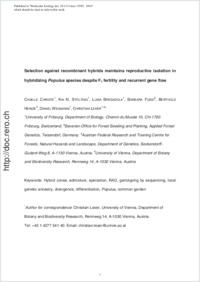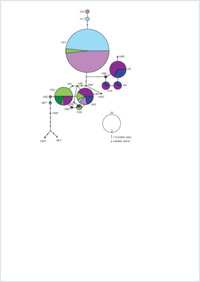Selection against recombinant hybrids maintains reproductive isolation in hybridizing Populus species despite F1 fertility and recurrent gene flow
- Christe, Camille University of Fribourg, Department of Biology, Fribourg, Switzerland
- Stölting, Kai N. University of Fribourg, Department of Biology, Fribourg, Switzerland
- Bresadola, Luisa University of Fribourg, Department of Biology, Fribourg, Switzerland
- Fussi, Barbara Bavarian Office for Forest Seeding and Planting, Applied Forest Genetics, Teisendorf, Germany
- Heinze, Berthold Austrian Federal Research and Training Centre for Forests, Natural Hazards and Landscape, Department of Genetics, Vienna, Austria
- Wegmann, Daniel University of Fribourg, Department of Biology, Fribourg, Switzerland
- Lexer, Christian University of Fribourg, Department of Biology, Fribourg, Switzerland - University of Vienna, Department of Botany and Biodiversity Research, Vienna, Austria
-
01.02.2016
Published in:
- Molecular Ecology. - 2016, vol. 25, no. 11, p. 2482-2498
Hybrid zones
Admixture
Speciation
RAD
Genotyping by sequencing
Local genetic ancestry
Divergence
Differentiation
Populus
Common garden
English
Natural hybrid zones have proven to be precious tools for understanding the origin and maintenance of reproductive isolation (RI) and therefore species. Most available genomic studies of hybrid zones using whole or partial genome resequencing approaches have focused on comparisons of the parental source populations involved in genome admixture, rather than exploring fine-scale patterns of chromosomal ancestry across the full admixture gradient present between hybridizing species. We have studied three well-known European ‘replicate’ hybrid zones of Populus alba and P. tremula, two wide-spread, ecologically divergent forest trees, using up to 432 505 Single Nucleotide Polymorphisms (SNPs) from Restriction site Associated DNA (RAD) sequencing. Estimates of fine-scale chromosomal ancestry, genomic divergence, and differentiation across all 19 poplar chromosomes revealed strikingly contrasting results, including an unexpected preponderance of F1 hybrids in the centre of genomic clines on the one hand, and genomically localized, spatially variable shared variants consistent with ancient introgression between the parental species on the other. Genetic ancestry had a significant effect on survivorship of hybrid seedlings in a common garden trial, pointing to selection against early-generation recombinants. Our results indicate a role for selection against recombinant genotypes in maintaining RI in the face of apparent F1 fertility, consistent with the intra-genomic ‘coadaptation’ model of barriers to introgression upon secondary contact. Whole genome resequencing of hybridizing populations will clarify the roles of specific genetic pathways in RI between these model forest trees and may reveal which loci are affected most strongly by its cyclic breakdown.
- Faculty
- Faculté des sciences et de médecine
- Department
- Département de Biologie
- Language
-
- English
- Classification
- Biological sciences
- License
-
License undefined
- Identifiers
-
- RERO DOC 258808
- DOI 10.1111/mec.13587
- Persistent URL
- https://folia.unifr.ch/unifr/documents/304896
Other files
Statistics
Document views: 185
File downloads:
- pdf: 407
- Supplementary material: 123

